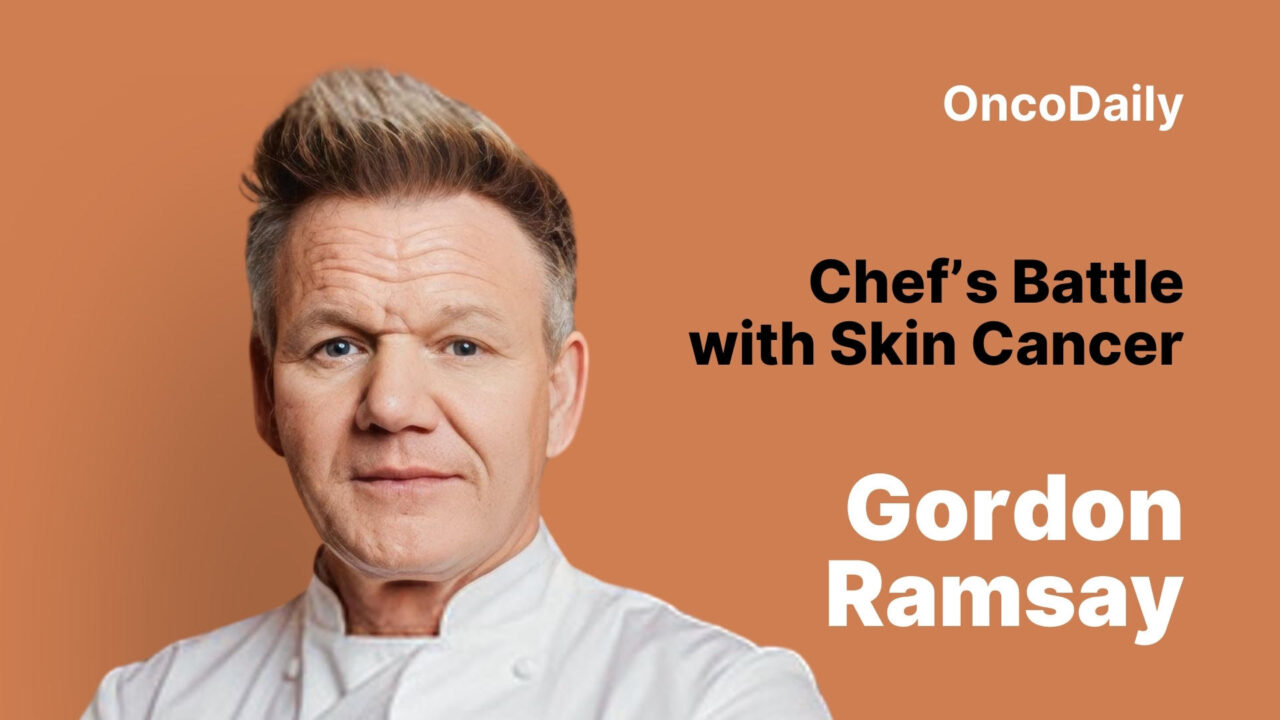Gordon Ramsay is a world-renowned British celebrity chef, restaurateur, and television personality known for his fiery temper, Michelin-starred restaurants, and popular cooking shows such as Master Chef and Hell’s Kitchen. Over his illustrious career, Ramsay has earned 17 Michelin stars and expanded his culinary empire across the globe.
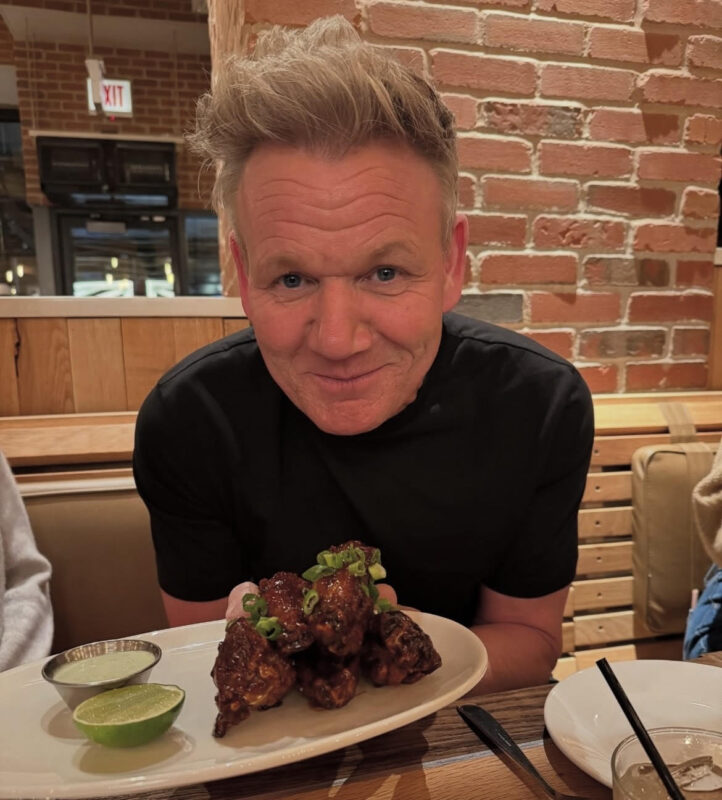
From @gordonramsay Insagram Account
Recently, Ramsay revealed that he underwent surgery to remove skin cancer from near his jawline. Sharing photos of the surgery site on social media, he used the opportunity to urge his fans and followers to prioritize skin protection and use sunscreen regularly to prevent skin cancer.
Ramsay’s Skin Cancer Diagnosis and Surgery
Basal Cell Carcinoma (BCC) is the most common form of skin cancer, typically arising in areas frequently exposed to the sun such as the face, jawline, and ears. It usually appears as a translucent, pearly bump or a non-healing sore and grows slowly but can cause significant tissue damage if untreated.
Treatment of BCC often involves surgical removal, with Mohs micrographic surgery being the gold standard for lesions on delicate areas like the ear and jawline. This technique allows for precise excision with minimal removal of healthy tissue, resulting in high cure rates and optimal cosmetic outcomes.
In Gordon Ramsay’s case, the cancerous lesion was located near the jawline close to the ear. He underwent surgery to excise the basal cell carcinoma, and photos shared on his social media showed bandages covering the surgery site along the jawline extending from near the ear downward.
Ramsay expressed his gratitude towards his medical team for their care and successful removal of the tumor, emphasizing the importance of prompt treatment and skin protection to avoid such conditions.
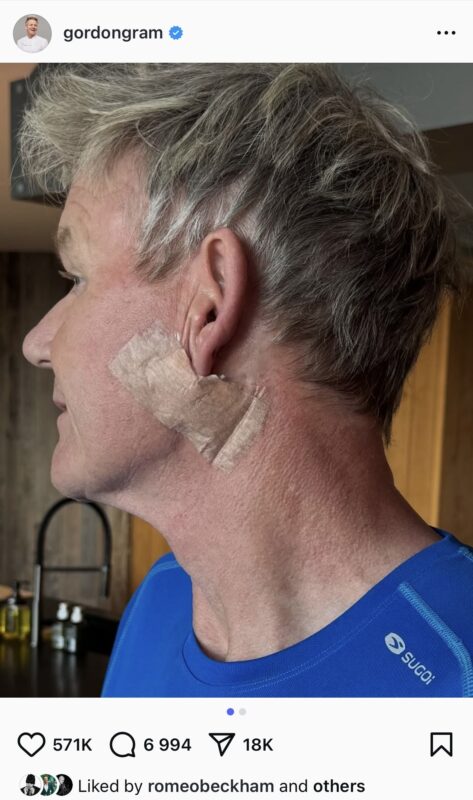
Grateful and so appreciative for the incredible team at The Skin Associates and their fast reactive work on removing this Basal Cell Carcinoma thank you ! Please don’t forget your sunscreen this weekend
VI promise you it’s not a face lift! I’d need a
refund……From @gordonramsay Insagram Account
Skin Cancer Awareness Message
Following his basal cell carcinoma surgery, Gordon Ramsay took to social media to urge his fans and followers to never forget to apply sunscreen. In a candid Instagram post, he shared photos of his stitches and bandages, humorously assuring his fans, “Please don’t forget your sunscreen this weekend… I promise it’s not a facelift! I’d need a refund.”
Ramsay’s message carries an important reminder: basal cell carcinoma, the most common form of skin cancer, is primarily caused by prolonged exposure to ultraviolet (UV) radiation from the sun or tanning beds. While this cancer rarely spreads, untreated cases can result in significant skin damage, especially in sun-exposed areas like the face and neck.
Health experts emphasize that daily, consistent use of broad-spectrum sunscreen with SPF 30 or higher is a simple but powerful tool to protect skin from DNA damage caused by UV rays. They warn that UV radiation can penetrate clouds and even windows, meaning sun protection is important even on cloudy days or indoors near windows.
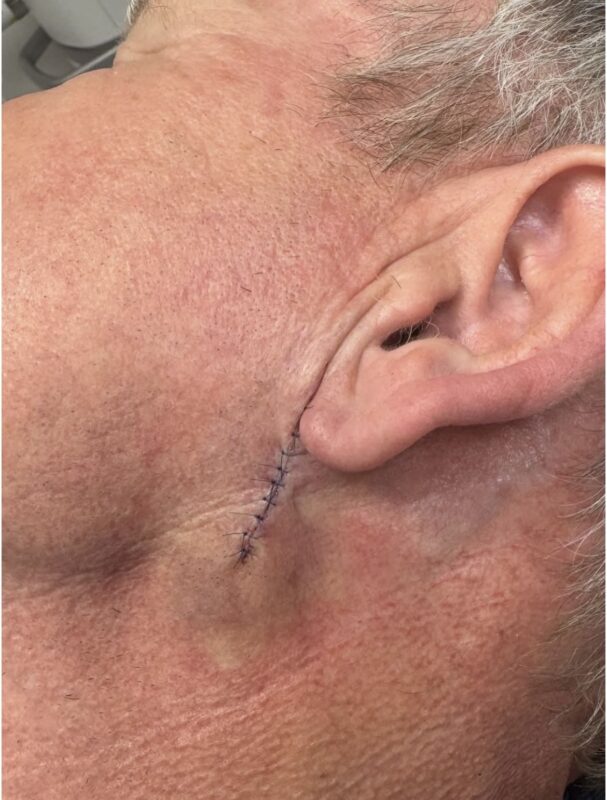
From @gordonramsay Insagram Account
Ramsay’s lighthearted but earnest admonition serves as a vital call to action: protecting skin with sunscreen, seeking shade, and wearing protective clothing are key steps everyone can take to prevent skin cancer.
Skin Cancer Facts and Celebrity Examples
Skin cancer is the most common cancer worldwide, with basal cell carcinoma (BCC) representing the majority of cases. The World Health Organization estimates millions of new skin cancer cases annually, driven largely by increased sun exposure and UV radiation due to lifestyle and environmental factors.
Numerous celebrities have publicly shared their skin cancer diagnoses to raise awareness and encourage preventive measures. These include actress Hugh Jackman, who has undergone multiple treatments for basal cell carcinoma, singer-songwriter Miley Cyrus, and television host Sharon Osbourne. Their openness helps destigmatize skin cancer and emphasizes that it can affect anyone regardless of age or background.
The use of sunscreen remains the single most effective way to reduce skin cancer risk. However, myths persist, such as sunscreen causing vitamin D deficiency or being unnecessary on cloudy days. Medical experts clarify that sunscreen protects against damaging UV rays, can be used year-round, and does not significantly impact vitamin D production when used appropriately.
Public education campaigns continue to stress the importance of daily sunscreen application, wearing protective clothing, and avoiding peak sun hours to lower the risk of all skin cancers and promote lifelong skin health.
You Can Also Read Hugh Jackman and Skin Cancer: How He Went Against, How He Survived by OncoDaily

Ramsay’s Recent Health Updates
In addition to his recent skin cancer surgery, Gordon Ramsay has previously shared updates about his health with fans. Last year, he posted a video on Instagram after a serious bicycling accident in Connecticut, showing bruising on his torso and urging followers to wear helmets for their safety.
Following his basal cell carcinoma diagnosis, Ramsay assured his fans that he is recovering well. In social media posts, he expressed gratitude for the prompt and skilled care from his medical team at The Skin Associates.
His openness about health challenges highlights the importance of awareness and safety, both in everyday activities and sun protection, reinforcing his message to the public to prioritize personal health and safety.
Fascinating Facts About Gordon Ramsay You Probably Didn’t Know
Gordon James Ramsay, born November 8, 1966, in Johnstone, Scotland, is a globally renowned British celebrity chef, restaurateur, television presenter, and writer. Raised in Stratford-upon-Avon, England, Ramsay initially aspired to become a professional footballer, but a career-ending injury redirected his path toward culinary arts. He trained under several of the world’s top chefs, including Albert Roux, Marco Pierre White, Guy Savoy, and Joël Robuchon.
In 1993, Ramsay became head chef at Aubergine in London, earning the restaurant two Michelin stars within three years. In 1998, at the age of 31, he opened his first wholly owned restaurant, Restaurant Gordon Ramsay, in Chelsea, London. This flagship restaurant swiftly earned three Michelin stars by 2001 and holds the distinction of being London’s longest-running restaurant to maintain this prestigious rating.
Throughout his career, Ramsay has amassed a total of 17 Michelin stars across his global portfolio, with restaurants spanning the United Kingdom, United States, Middle East, Asia, and beyond. Some notable establishments include Pétrus in London, Le Pressoir d’Argent in Bordeaux, and several award-winning venues in Las Vegas and New York City.
Ramsay’s fiery temper, strict standards, and candid approach have made him a fixture on television with popular shows like Hell’s Kitchen, MasterChef, Kitchen Nightmares, and The F Word. His TV persona, blending tough coaching with culinary excellence, has captivated worldwide audiences, earning him awards including a British Academy Television Award.
Beyond restaurants and television, Ramsay is a successful author, multimedia producer, and social media influencer, commanding millions of followers who engage with his culinary content and advice. He was appointed Officer of the Order of the British Empire (OBE) in 2006 for his contributions to hospitality.
From an aspiring athlete to one of the world’s most influential chefs, Gordon Ramsay’s career reflects unmatched culinary skill, relentless ambition, and cultural impact across food and media industries.
How Prevent Skin Cancer?
Preventing skin cancer involves a comprehensive approach to reduce exposure to ultraviolet (UV) radiation, including seeking shade during peak hours, wearing protective clothing like long sleeves and hats, applying broad-spectrum sunscreen with SPF 30 or higher daily, avoiding tanning beds, and conducting regular skin checks for early detection.
Protect Your Skin from UV Radiation
To protect your skin from harmful UV radiation, it’s important to take a comprehensive approach. Avoid direct sunlight between 10 a.m. and 4 p.m., when UV rays are at their strongest, by seeking shade whenever possible. Wearing protective clothing—such as long-sleeved shirts, pants, wide-brimmed hats, and UV-blocking sunglasses—provides an effective physical barrier against sun exposure. Additionally, apply a broad-spectrum sunscreen with an SPF of 30 or higher daily, even on cloudy days. Sunscreen should be reapplied every two hours, or immediately after swimming or excessive sweating, to maintain its protective effect.
Equally important is avoiding artificial sources of UV radiation. Tanning beds and sunlamps emit UV rays that are just as damaging as natural sunlight and significantly increase the risk of developing skin cancer. For safe skin, it’s best to avoid these devices altogether and opt for safer alternatives if tanning is desired.
How to Use Sunscreen for Maximum Protection?
Step 1: Apply Sunscreen Correctly
To ensure full coverage, apply about 1 ounce (30 ml) of sunscreen to cover your entire body, which is roughly the amount that fits in a shot glass. For the face, use about a teaspoon. It’s important to apply sunscreen 15-30 minutes before going outside to allow it to absorb fully. Make sure to rub the sunscreen thoroughly into all exposed skin areas, including often-missed spots like the ears, back of the neck, tops of the feet, and hands.
Step 2: Reapply Sunscreen
Reapply sunscreen every two hours or immediately after swimming or sweating to maintain effective protection. Consistency is key, so make sunscreen application a regular part of your daily routine, even on cloudy days when UV rays can still penetrate the clouds.
Step 3: Additional Tips
Apply sunscreen as the last step in your skincare routine, after moisturizer, to ensure it’s effective. For hard-to-reach areas like your back, use a spray sunscreen or ask someone to help apply it. Don’t forget to protect your lips with a lip balm that contains SPF.
You Can Also Read Does Sunscreen Cause Cancer Myths and Facts by OncoDaily
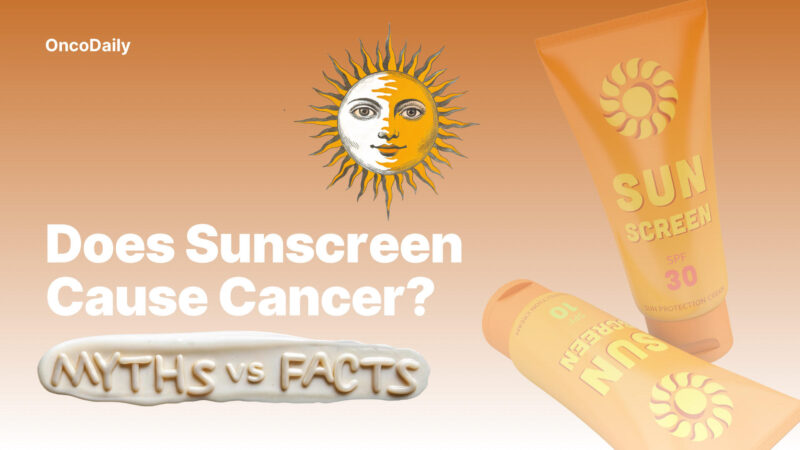
What Cause Skin Cancer?
Skin cancer risk is influenced by both environmental and genetic factors. Prolonged UV exposure, chemical contact, infections, and certain medical treatments all contribute to increased vulnerability, especially in outdoor workers and older adults. Genetics also play a key role—people with fair skin, a family history of skin cancer, or weakened immune systems face higher risks. Understanding these factors is essential for prevention and early detection.
Environmental and Lifestyle Factors
Exposure to environmental factors plays a significant role in increasing skin cancer risk. Ozone depletion allows more ultraviolet (UV) radiation to reach the Earth’s surface, intensifying the potential for skin damage. Geographic location also matters—people living at higher altitudes or closer to the equator are exposed to stronger UV rays. Additionally, prolonged sun exposure over a lifetime, especially without proper protection, contributes to the cumulative risk of developing skin cancer, making age a non-negligible factor.
Occupations that involve working outdoors, such as farming or construction, further increase risk due to constant UV exposure. Exposure to certain chemicals, including arsenic, coal tar, and industrial substances, has been linked to higher rates of skin cancer. Viral infections, particularly with specific strains of the human papillomavirus (HPV), are also associated with the development of squamous cell carcinoma.
Smoking has been directly linked to squamous cell carcinoma, especially on the lips, while other lifestyle choices such as diet may influence skin health, although their direct connection to cancer is less clear. In some cases, chronic wounds, scars, or inflammatory skin conditions can evolve into cancerous lesions, particularly squamous cell carcinoma. Medical treatments like radiation therapy, phototherapy, and PUVA (psoralen combined with ultraviolet A light) may also increase susceptibility to skin cancer by damaging skin cells over time.
Genetic and Biological Factors
Genetic predisposition plays a critical role in skin cancer risk. Individuals with fair skin, light-colored eyes, and red or blond hair are more vulnerable due to lower levels of melanin, the pigment that helps protect skin from UV damage. These individuals absorb more UV radiation and experience more DNA damage when exposed to the sun. A family history of skin cancer, particularly melanoma, further elevates the risk, indicating an inherited susceptibility.
Immune system function is another important factor; people with compromised immune systems, such as those undergoing organ transplants or living with HIV/AIDS, have a diminished ability to repair DNA damage, leading to higher rates of skin cancer. This combination of inherited traits and immune suppression underscores the importance of personalized risk assessments and preventive strategies for those at higher genetic risk.
Written by Aharon Tsaturyan, MD, Lead of OncoDaily Volunteers, Editor at OncoDaily Intelligence Unit.
FAQ
How many Michelin stars has Gordon Ramsay earned?
Gordon Ramsay has earned a total of 17 Michelin stars throughout his career.
What are Gordon Ramsay’s most popular TV shows?
His most popular TV shows include Hell’s Kitchen, MasterChef, Kitchen Nightmares, and The F Word.
Where are Gordon Ramsay’s flagship restaurants?
His flagship restaurant, Restaurant Gordon Ramsay, is located in Chelsea, London, and holds 3 Michelin stars.
What is Gordon Ramsay's cooking style?
Ramsay is known for his modern European cuisine with a focus on high-quality ingredients and meticulous technique.
Has Gordon Ramsay won any awards?
He was awarded an OBE (Officer of the Order of the British Empire) in 2006 for his contributions to hospitality
What type of skin cancer did Gordon Ramsay have?
Ramsay was diagnosed with basal cell carcinoma, the most common form of skin cancer caused mainly by UV exposure.
When did Gordon Ramsay reveal his skin cancer diagnosis?
He revealed it publicly in late August 2025 through social media posts.
Where was Gordon Ramsay’s skin cancer located?
The lesion was near his jawline, close to his left ear.
What treatment did Gordon Ramsay undergo for his skin cancer?
He underwent surgical removal of the basal cell carcinoma with successful excision.
What message did Gordon Ramsay share after his diagnosis?
Ramsay urged fans to regularly use sunscreen and take skin protection seriously to prevent skin cancer.


